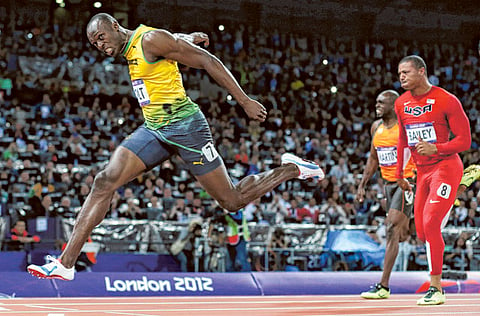Olympic king Bolt seals legend status
Britain basked in gold-medal glory in 2012 thanks to Ennis and Farah

Paris: Jamaican sprint star Usain Bolt cemented his status as a true legend of track and field by claiming a second Olympic treble gold medal haul at the London Games.
Bolt followed up his podium-topping showing in Beijing in 2008 by becoming the first sprinter to defend both the 100m and 200m.
He then led home the 4x100m relay team in a world record-breaking 36.84sec to cap a pulsating nine days of track and field at the Olympic Stadium in east London.
“It’s what I came here to do. I’m now a legend, I’m the greatest athlete to live,” said Bolt.
“For 2013, the objective is to go as fast as possible and win the 100m title at the world championships in Moscow,” which run between August 10-18.
Rarely can there have been a week’s athletics as enthralling and entertaining as that at the London Olympics.
Every session at the 80,000-capacity Olympic Stadium was a sell-out, and the knowledgeable public helped make for an electric atmosphere, notably on the first Saturday when Britain won three gold medals in the space of 45 frenetic minutes.
While Bolt stole the headlines for his sprinting prowess, David Rudisha also produced an outstanding performance on the track, although his Kenyan team endured a relatively disappointing Games.
The Masai tribesman obliterated his own world record in the 800m, running 1:40.91 in the highest quality two-lap race ever seen. Last-placed Andrew Osagie’s time would have won him gold in the Beijing Games by 0.88sec.
Britain’s gold medal rush was kicked off by poster-girl Jessica Ennis, who dominated the heptathlon.
She was superseded by Mo Farah, a devout Muslim born in Somalia but a London resident since the age of eight, who galvanised a nation in the most multi-cultural of world cities when he became the seventh runner to win the 5000m-10,000m double.
The sheer spectacle on the final night’s action when Farah kicked for home with just over a lap of the 5000m remaining was a spine-tingling experience those in the stadium will never forget.
The track and field also broke new ground when South African Oscar Pistorius became the first double amputee to race in an Olympics.
He failed to qualify for the individual 400m final, but anchored his team in the 4x400m relay final, in which they finished last.
The United States finished atop the athletics medals table with a total of 29 medals, comprising nine gold, 13 silver and seven bronze, for their best haul since the 1992 Games in Barcelona.
Russia came in second with 18 (8-4-6) and the Bolt-inspired Jamaica in third on 12 (4-4-4).
There was also a world record for American Aries Merritt in the men’s 110m hurdles, the American clocking 12.80sec at the Diamond League meet in Brussels to smash the previous record of 12.87 set by Cuban Dayron Robles in June 2008.
Bolt and American sprinter Allyson Felix were named the International Amateur Athletics Federation’s athletes of the year.
It was the fourth time in the last five years that Bolt has won the award, but the first time for Felix, who also won three golds in London, in the 200m and in both the women’s relay races.
The highest-profile casualty in the war on doping was Belarus shot putter Nadezhda Ostapchuk, who was stripped of her Olympic gold after testing positive for a banned anabolic steroid.
New Zealand’s Valerie Adams was handed gold, but Ostapchuk only received a one-year ban because her coach had doctored her food without her knowledge.
Four medallists from the 2004 Olympic Games were officially stripped of their medals by the International Olympic Committee.
The IOC took the decision after new analysis of their dope tests taken at the Athens Games revealed traces of steroids.
Ukraine’s Yuri Belonog was stripped of his shot put gold, Belarus’ Ivan Tikhon of his silver in the hammer, and Irina Yatchenko of Belarus and Russian Svetlana Krivelyova lost their bronze medals in the women’s discus and shot put respectively.
It is the second Olympic medal Tikhon has been stripped of, having had his bronze from the 2008 Games taken away also for a doping offence.
Ironically, the disgraced Ostapchuk was promoted to the podium in place of Krivelyova and will receive a bronze.



